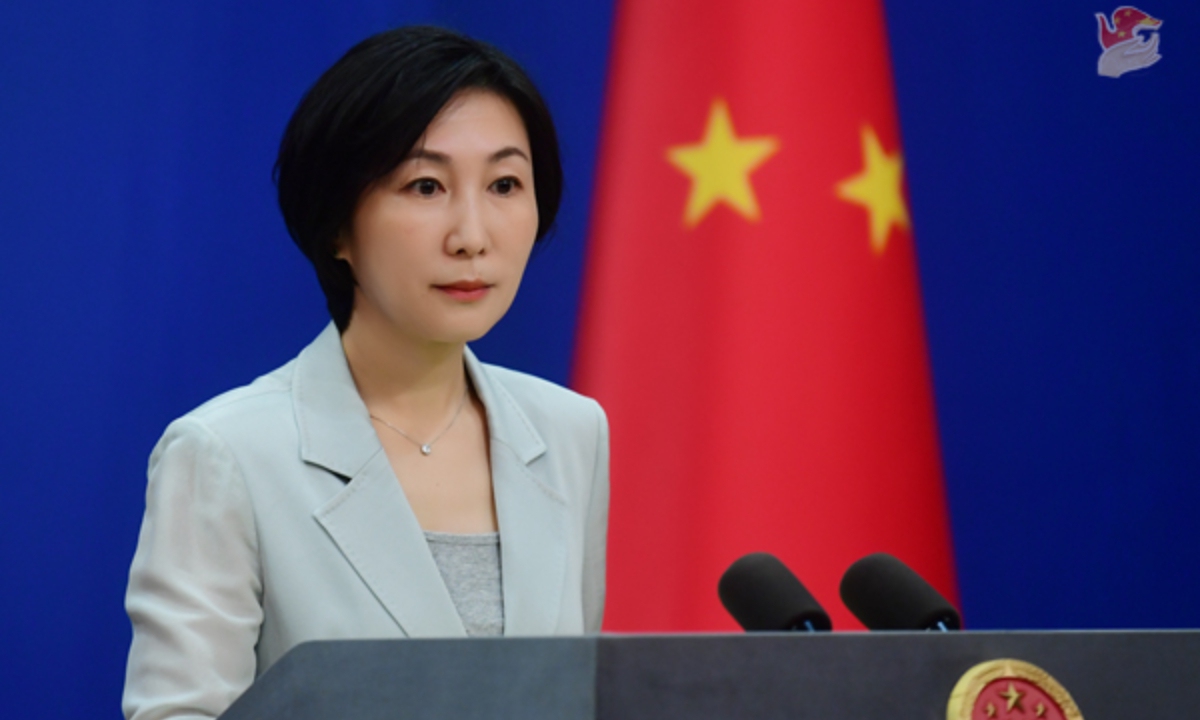
Foreign Ministry Spokesperson Mao Ning Photo: Ministry of Foreign Affairs
In response to Philippine Defense Secretary Gilbert Teodoro's claims that the deployment of US Typhon mid-range missile system to the Philippines in the context of joint exercises is legitimate and legal, Chinese Foreign Ministry spokesperson Mao Ning said on Thursday that regarding the US deployment of Mid-Range Capability (MRC) missile system in the Philippines, China has stated its firm opposition on multiple occasions, while emphasizing that Typhon MRC missile system can carry either conventional or nuclear payloads. It is not a defensive weapon, but a strategic and offensive one, she said.
The Philippines has worked with the US to bring in the Typhon system. It's placing its national security and defense in the hands of others, introducing geopolitical confrontation and arms race into the region and posing substantive threat to regional peace and security. Whose interest does this move serve? How could anyone believe this is independent foreign policy? What the Philippines is doing benefits no one, the spokesperson said.
The Philippines once clearly promised that it will not choose sides between major countries, not engage in any activities that will harm China's interest and doesn't intend to incite tensions in the region. Despite these clear promises, however, the Philippines has helped country outside the region deploy military forces and stoke confrontation in the region, Mao said.
Who's been making provocations and stirring up trouble in the South China Sea? Who's been cooperating with external forces to flex muscle? Who's broken the international law and yet claims to uphold it? The answer is quite clear to countries in the region, Mao stated. The Philippines said openly that the Typhon system was only used during Balikatan and Salaknib exercises and will be shipped out of the country in September following the military exercises. But then the Philippine side went back on its word, saying they would like to have the Typhon here in the Philippines forever and even plan to acquire the systems. This is a deliberate breach of the Philippines' own words, said Mao.
Who's been making provocations and stirring up trouble in the South China Sea? Who's been cooperating with external forces to flex muscle? Who's broken the international law and yet claims to uphold it? The answer is quite clear to countries in the region, Mao said.
We once again urge the Philippines to bear in mind that the only right way to safeguard national security is to uphold strategic independence, good-neighborliness and friendship, and peaceful development, Mao said, also calling on the Philippines to heed the call of regional countries, quickly pull out the missile system as publicly pledged, and stop aggravating its wrongful act. Some individuals in the Philippines need to correct their understanding, reflect on their own words and deeds, and stop inverting the truth and pretending to be the victim.
Our message to the Philippines: China will not sit on its hands when its security interests are in danger or under threat. The Philippines will be hurting its own interests if it keeps refusing to change course, she said.
On the same day, Zhang Xiaogang, a spokesperson for China's Ministry of National Defense, also said during the regular press conference that the Philippine side repeatedly organized its coast guard vessels and fishing boats to violate China's territorial sovereignty and maritime rights and interests, and undermine peace and stability in the South China Sea, while playing victim to elicit sympathy and cause confusion in the international community, and this will never work.
Xu Liping, director of the Center for Southeast Asian Studies at the Chinese Academy of Social Sciences, told the Global Times on Thursday that a series of Philippines' actions in the South China Sea are, on the one hand, a provocation, and on the other, aimed at mislead the international community to garner sympathy.
In particular, the deployment of medium-range missiles could potentially trigger an arms race among regional countries and undermine peace and stability in the area, Xu added.




